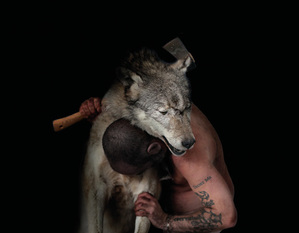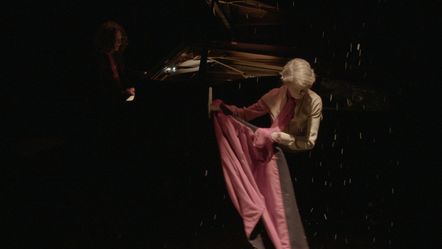Manchester International Festival
 Douglas Gordon
Douglas Gordon Gordon has worked with the piano before: in The End of Civilisation, he set a piano on fire in the Cumbrian hills and filmed it burning. Grimaud is a world-renowned pianist and only slightly less well-known as a wolf conservationist, having established a wolf conservation centre in New York State. And Gordon is also fascinated by wolves, hence this Manchester International Festival commission.
Gonzalez Peña’s script is, ostensibly, a version of the Red Riding Hood story: playing to a cultural fear of wolves and of evil - not the depiction Grimaud would champion in her other life. For many cultures the wolf is a positive, even heroic figure: contrast the reverence given by the American Indians with the loathing and fear imported from Europe by later Americans.
 Photo: Mat Hennek
Photo: Mat Hennek Hélène Grimaud personifies that struggle, while the other artists had no such dilemma. A piece about the ecology of a keystone species that evokes powerful and contradictory feelings would be a tremendous creative challenge for someone, but Neck of the Woods turns out not to be that piece.
For Gordon and González Peña, it is firmly rooted in the tradition of myth-making, which, on balance, has not served the wolf well. Rather than use art to illuminate and challenge perceptions, it seemed to me to take the easier route – to build on what centuries of ignorance have offered us many times before. There is an ulterior agenda, for sure. Gordon has stated that he wanted to show that “men are worse than wolves” thereby once again using wolves to set a benchmark for measuring others’ badness.
So Hélène Grimaud’s personal mission to right all the misperceptions about wolves, and their consequences for the species, has had to take second place.
 Jutta Pohlmann
Jutta Pohlmann In between, Rampling tells her story, blended with that of Little Red Riding Hood. Waking from a nightmare about wolves, she takes us through the narrative a few sentences at a time. She and Grimaud alternate a dozen or more times. This is two one-woman shows, chopped up and performed in turn. We hear Rachmaninov and some dark minor-key chords. A few more lines of narrative and then, as interludes between fragments of text, mini-medleys of Bach-with-Schumann, Rachmaninov-with-Beethoven, Ravel, Chopin.
Now and again the disembodied and chilling voice of Gordon hints at the real story. Rampling has complete command of the pace of the narrative, and of her coldly traumatised persona. Grimaud is, as always, in command of her material, and occasionally dazzles. The Sacred Sounds Women’s Choir is effective in the dark, behind a black gauze curtain, with wordless vocalisations, and dimly-lit hand gestures in imitation of the wind-blown trees that haunt Rampling’s nightmares (and in which live wolves).
It is, in the end, a story about men (one man) and an evil worse than any wolf. This is signalled often and early enough for there to be no shocking reveal. The music is there to pace the narrative, to slow down what is always going to come. The lighting and the occasional snow, and odd bits of ambient sound from Eno add a bit, but not much, to what is basically a showcase for two talented women and a story; just about the sum of its parts.
Neck of the Woods runs at HOME, 2 Tony Wilson Place, First Street, Manchester, as part of the Manchester international festival, until18 July.
 RSS Feed
RSS Feed
